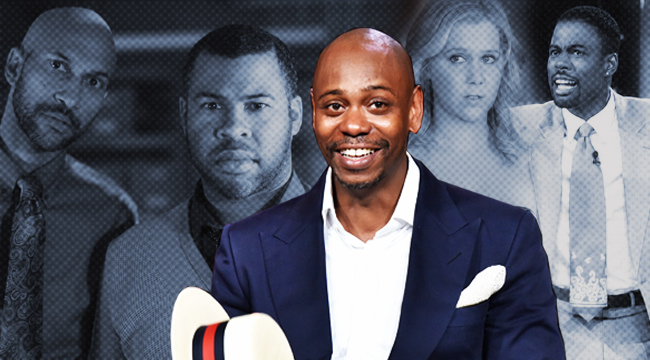
Confusion over comments that Dave Chappelle made about the 2016 Presidential Election (wherein he said some things about Donald Trump, was branded a Trump supporter, and strongly refuted those assertions) should help make for an interesting monologue on Saturday Night Live this weekend. But while some may be weary because of those remarks, it seems unlikely that Chappelle’s return to the sketch comedy space will be defined by recent political developments. Though he dabbled with impressive proficiency, Chappelle was always more comfortable directly tackling political issues than the political process itself. And after the last few days, that should be welcome relief.
It’s been hard, of late, to consider the notion of thought-provoking comedy absent the context of the electoral process. But following an election that oddly centered more on the (deeply flawed) candidates than on the issues and challenges facing voters, it’s vital to remember that those issues exist and that they would have plagued us no matter the results on Tuesday. Even in this moment of mounting anger and disappointment (among some, not all, of course), we need to examine those issues — soberly, at some point, but perhaps with the aid of a few laughs right now. Because a lot of us could use a few laughs right now, even if the numbing effect is ever so brief.
Saturday Night Live is not the place for deep issue-based satire. That’s not so much a knock on the show as an observation. Each episode is an astonishing accomplishment as the cast and crew manage to hurdle through a week at a breakneck pace to deliver 90-minutes of live comedy with a thousand unseen moving pieces, but the approach naturally leads to more silliness than salient points.
Chappelle’s Show was no doubt inspired by a time when tackling social issues in a pointed way was a heavier part of what SNL did. In Living Color, Richard Pryor’s comedy, and The Chris Rock Show also deserve credit for clearing the path. But while those influences were key, all credit for the show’s lasting impact goes to Chappelle’s provocative sensibility and his ability to comment on issues of race with the language of pop culture in an effort to reach a broad audience without sacrificing the weight of his message
https://vimeo.com/61499874
Re-watching some of Chappelle’s finest sketches makes it hard to believe that the show has been off the air for a decade. In Chappelle’s self-imposed absence, Comedy Central has continued to be fertile ground for shows that have served as a kind of hip counter to Saturday Night Live‘s more staid reputation in the way that Chappelle’s Show did in the early aughts and in the way that In Living Color, Kids In The Hall, The State, and Mr. Show did in the ’90s. But Kroll Show and Key & Peele (which Chappelle has jokingly dismissed as a copy of his show) are gone and Inside Amy Schumer‘s future is up in the air. In their absence, Saturday Night Live stands mostly alone in terms of high-caliber sketch shows, but it’s built to be all things for all comedy fans, not meant to be hyper-focused on political and issue-based satire.
Essentially, sketch comedy currently has a yin but no yang. And right now, we need that balance and that buzzy, alternative-minded sketch comedy that can examine and satirize issues that may not make it onto every episode of Saturday Night Live. With Dave Chappelle hosting SNL on Saturday, chances are fair that we’ll get a reminder of how powerful that kind of comedy can be (and how important SNL can be under the right circumstances), but then the credits will roll, Chappelle will say goodnight, and the fast will begin once more leaving a void when we need something to fill that space.
Perhaps, this all sounds excessive. It is, in the grand scheme of things, just a few jokes. But there are times (like these) when we reach for normalcy, for relief, for balance, and sometimes reinforcement that our outrage is the right kind of outrage. The work of late night hosts like Seth Meyers, Stephen Colbert, Trevor Noah, Samantha Bee, and John Oliver helps, but their kind of comedy often translates to clever, yet straight, assessments on a myriad of real issues with varying depth. Sketch comedy, when timed and executed perfectly, can inform us in a subtle way that seeps into the soil of our life. We nod because these shows and comics “get it,” we laugh about these sketches with friends and share them on Twitter and Facebook allowing awareness to spread. And to be more aware is a good thing. To be more engaged is a good thing. Eyes wide open, now, more than ever.
Jason Tabrys is the features editor for Uproxx. You can engage with him directly on Twitter.






